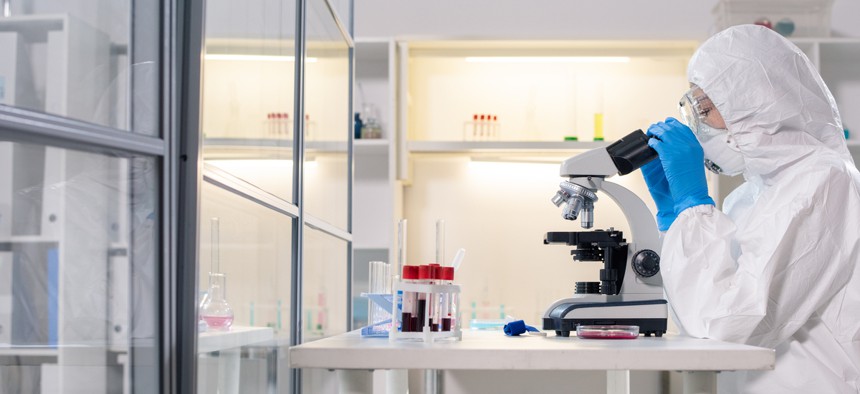Republican Lawmakers Propose Bill to Support Government COVID-19 Research Effort

Pressmaster/Shutterstock.com
The COVID Research Act includes several authorizations, including $50 million to the Energy Department.
Rep. Frank Lucas, R-Okla., recently introduced legislation to codify a range of federal research efforts countering COVID-19 and strategically boost the government’s technological capabilities to forecast future health threats.
Co-sponsored by eight other House Republicans, the Computing Opportunities to Vanquish Infectious Diseases Research Act of 2020—or COVID Research Act—authorizes a standing advisory committee and interagency working group focused on emerging infectious diseases, and would grant the Energy Department’s Infectious Disease Research Program $50 million for several responsibilities over the next couple years.
“One of the most valuable things we in Congress can do in the fight against COVID-19 is give our federal scientific agencies the resources needed to provide an immediate response and to better prepare us for future disease outbreaks,” Lucas said in a statement.
The new legislation authorizes the White House Office of Science and Technology Policy interagency working group on Emerging Infectious Disease Prediction and Forecasting, which according to the bill, is intended to “coordinate federal programs and activities for emerging infectious disease data acquisition, analysis, situational awareness, prediction and forecasting, and other related activities.” On top of a few other responsibilities, Lucas’ legislation directs the group to explore barriers America faces in terms of outbreak prediction and subsequently develop a national strategy to more effectively confront infectious diseases.
The COVID Research Act also authorizes the National Academies of Science Standing Committee on Emerging Infectious Disease and 21st Century Health Threats, which came together under direction from the White House earlier this year. Made up of experts across industry, academia and the government, the committee is meant to advise and inform federal officials and on issues across emerging infectious diseases, biosecurity and public health and medical preparedness.
“Our National Labs have already shown the value of using high-performance supercomputing and advanced research facilities to model the novel coronavirus, understand its effects on human cells, and predict its spread,” Lucas also noted in the bill’s announcement.
With those efforts and others in mind, the legislation offers up $50 million to support relevant work in Energy’s Infectious Disease Research Program over the next two years. Officials in that program would be directed by the new bill to work in cooperation with the National Science Foundation and NASA to institute a research initiative to “leverage the federal government’s innovative analytical tools and advanced computational and networking capabilities in order to prevent, prepare for, and respond to emerging infectious diseases, including COVID–19.” Through the effort, the agencies would further incorporate the government’s high-performance supercomputers to help characterize, model, simulate and forecast complex phenomena connected to emerging infectious diseases.
Further, the bill also calls for Energy, NSF and OSTP to operate an Emerging Infectious Diseases High Performance Computing Research Consortium that is intended to act as “a centralized location for multidisciplinary, collaborative, emerging infectious disease research and development through high performance computing and advanced data analytics technologies and processes.”
“The COVID Research Act authorizes a strategic and coordinated approach so our scientists and researchers have the resources they need to succeed,” Lucas said.
Following its introduction Thursday, the bill was subsequently referred to both the Science, Space, and Technology and Energy and Commerce committees.






